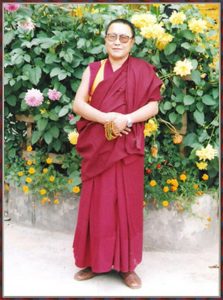BY NYIMA LHAMO
NEW YORK DAILY NEWS
Tuesday, February 21, 2017, 10:20 AM
 A week before the UN Human Rights Council opens its 2017 session, with China starting a new three-year term, I will be there to provide a dissenting voice: a rare moment of truth about the tribulations of the people of Tibet.
A week before the UN Human Rights Council opens its 2017 session, with China starting a new three-year term, I will be there to provide a dissenting voice: a rare moment of truth about the tribulations of the people of Tibet.
Six months after escaping from Tibet, I am proud to represent my people Tuesday at the ninth annual Geneva Summit for Human Rights and Democracy, where I will be one of many dissidents, activists, victims and relatives of political prisoners convening in Geneva to share our experiences and to make sure that the United Nations addresses the plight of our people.
I am the niece of Tenzin Delek Rinpoche, a highly respected Lama in my village Kham Lithang in Eastern Tibet, who was wrongly imprisoned in April 2002 by the Chinese authorities under false claims of being involved in terrorism, died in prison after serving 13 years of a life term and was denied his rights after death to a proper Buddhist religious ceremony and burial.
Prior to his arrest, my uncle was known and respected for his philanthropic works in Eastern Tibet where he established schools, clinics, orphanages and old age homes and worked to preserve the environment.
He was recognized by the Dalai Lama as a living Buddha. My uncle modeled for me the Buddhist virtue of always helping others.
That is why I am risking the well-being of my family still in Tibet, where I left behind my mother and 6-year-old daughter, to come here to speak publicly of my uncle’s murder and to call upon the UN to pressure China to conduct a thorough investigation into the circumstances surrounding his conviction and ultimate death.
Throughout his years in prison, my uncle’s rights were grossly violated. He was repeatedly beaten, kept in isolation, denied his rights under Chinese law to regular visits from his family and denied medical treatment and medical parole.
Now, I ask, if my uncle died of cardiac arrest, as the Chinese authorities claim, then why do they not provide us copies of the death certificate or medical records?
Why did they not conduct a post-mortem exam to determine the cause of death?
Why did they deny us the body for proper Buddhist burial and insist the cremation be done immediately?
Why did they detain my mother and me for more than two weeks after my uncle’s death and, insist, as a condition of our release, that we make no accusations against the Chinese authorities that he died of poisoning?
After many months of my family being under surveillance, with a CCTV camera being placed outside the gate of our home, visitors to our home being arrested, Chinese officials and security personnel watching us constantly and my freedom of movement severely restricted, I decided to flee to India to appeal to the international community for assistance in our case and to bring attention to the cause of the many political prisoners in Tibet sill being subjected to the same fate as my uncle.
China, a member of the UN Human Rights Council, has been the illegal occupier of Tibet since 1949. In the nearly 70 years since, China has trampled the rights and freedoms of the Tibetan people, denying us our right to practice our religion and preserve our language and cultural traditions, closely monitoring our day to day activities, destroying our environmental resources, and curtailing our freedom of movement. China is known for trying to silence its critics, even at the UN.
Today, there are thousands of Tibetan political prisoners, victims of China’s widespread practice of arbitrary detention. Among these is Tashi Wangchuk, whose sole crime was advocating for greater Tibetan language education, and now, like my uncle, stands accused of inciting separatism. Tibet’s prisoners are routinely subjected to brutal torture and their health deteriorates quickly due to the harsh conditions.
Sadly, the world is silent in the face of these abuses. Not only has the UN’s highest human rights body failed to produce a single resolution, special session or inquiry on gross abuses in China, but the Communist regime sits there as a member, judging others.
It is my sincere hope that my being at the Geneva Summit today, and speaking out on behalf of my people, will help bring China to account for the situation in Tibet — and for my uncle’s death.
Lhamo is a Tibetan activist who today addresses the Geneva Summit for Human Rights, an annual gathering of dissidents who defy dictatorships.




 Print
Print Email
Email